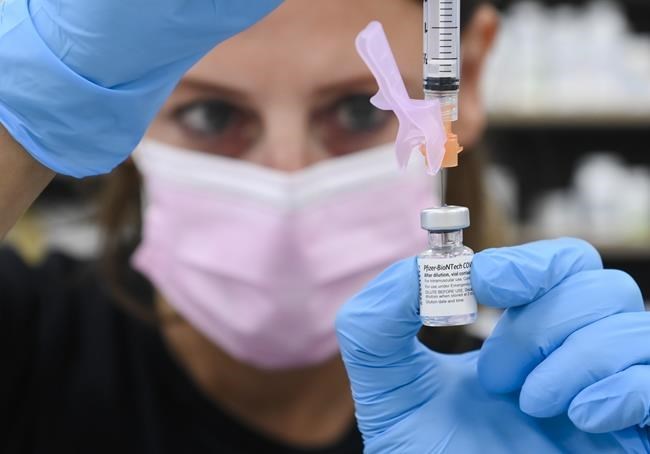OTTAWA — A national advisory panel recommended Friday people who are immunocompromised should receive a third vaccine dose against COVID-19.
It's the latest piece of advice to come from the National Advisory Committee on Immunization (NACI), which says people who are moderately to severely immunocompromised are shown to have a weaker response to vaccinations.
Even without the official advice, provinces like Ontario and Alberta have relied on their own health experts and gone ahead with offering third doses to those considered more medically vulnerable, such as seniors living in long-term care and patients who received transplants, are undergoing cancer treatments or are otherwise immunosuppressed.
Saskatchewan announced Friday it too would begin giving a third shot to seniors starting in October. It said third doses would start being administered this week to those who are immunocompromised.
The national committee affirmed that those with weaker immune systems stand at greater risk of developing complications and dealing with the infection for longer if they contract COVID-19.
"An additional dose contributes to health equity by providing another opportunity for immunocompromised individuals to develop a better immune response which could offer better protection against COVID-19," NACI says in written advice.
It recommends those who are not yet vaccinated to receive three doses of an approved mRNA vaccine, which in Canada means shots from either Moderna or Pfizer-BioNtech.
The committee also calls for giving an additional dose of one of these shots to immunocompromised people who have been double vaccinated, including those who received mixed doses.
"This is not unusual for immunocompromised groups, where we often recommend different vaccine schedules to help them achieve better protection," Dr. Shelley Deeks, committee chair, said in a statement.
"This is different from a booster dose, which would be used to boost an immune response that has waned over time."
It adds people should consider taking a viral-vector vaccine like AstraZeneca only if they have a medical reason that makes them unable to take one of the mRNA vaccines, or can't access one.
Canada's chief public health officer Dr. Theresa Tam says the advice applies to people 12 and older whose immune systems are compromised for a variety of reasons like being treated for a tumour or having an untreated HIV infection that has advanced.
"There's a very broad group of individuals who may have either underlying health condition or a treatment that's rendered them more immunocompromised," she said at a briefing Friday. "Talk to your health provider and discuss your particular situation."
The advisory body says giving those who are immunocompromised a third dose is different than offering a booster shot to the general population because for most two doses of vaccine protect against COVID-19.
The panel says it continues to study the need for booster shots for specific groups, like those in long-term care.
The World Health Organization has called for wealthy nations to avoid giving their residents widespread access to booster shots so to see more supply sent to poorer countries that have less overall vaccination coverage, making their citizens more exposed to the virus.
Health Canada reported Friday that 77 per cent of people 12 and older have been fully vaccinated against COVID-19, while around 84 per cent of individuals have received their first dose.
Tam cautioned that new cases of COVID-19 could reach levels "higher than we've seen thus far" since March 2020 when the pandemic hit because of the fast-spreading Delta variant of the virus.
"There is a risk that hospitalization rates could overwhelm capacity unless we quickly increase vaccine coverage or implement other measures to slow the continued acceleration," she said.
"With 7.3 million eligible Canadians not yet fully vaccinated with two doses and 4.8 million too young to get the vaccine, there are still far too many susceptible people and opportunities for the virus to spread."
Nationally, Tam said the average number of new daily cases has increased to more than 3,700, with an average of 1,600 COVID-19 patients being treated in hospitals in each day, including 546 people in intensive care.
This report by The Canadian Press was first published Sept. 10, 2021.
— With files from The Associated Press
Stephanie Taylor, The Canadian Press

